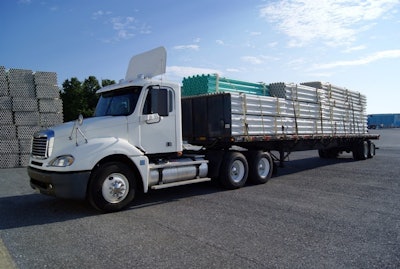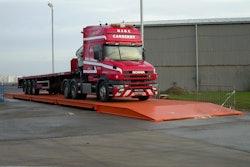
Overweight trucks mean bad news — both for the driver and the business. Companies need to exercise strict measures to avoid overweight truck fines. One way to achieve this is by using truck scales in the facility to accurately weigh the load and the truck before sending them out.
Here are four crucial points to remember about overweight trucks:
• It can lead to jail time – There is a good possibility of the truck driver driving an overweight truck going to jail not just for a night but for a few months. The county’s court system may even decide to revoke his commercial driver’s license.
• Slammed with huge fines – Excess weight equates to money. If you carry anything over the permissible weight, the law enforcement will write up huge overweight truck fines, amounting to a few thousands of dollars. That’s not all – even the companies may be fined for allowing overweight trucks to be sent on the road. Some states charge double or triple the fine for repeat offenders.
• Deliveries get delayed – Numerous weigh stations force drivers to “shut down” the operations if the truck weight exceeds the permissible weight. If it weighs more than 6,000 pounds over the maximum gross weight, don’t be surprised to find your truck and operations coming to a halt, thus impacting delivery schedules. You would need to send another truck for unloading excess weight, thus wasting time and money.
• Increased risk of accidents – Performance of the truck will be affected due to the excess weight. For instance, overweight trucks may go down an incline much faster than expected by the truck driver, thus requiring additional braking force to stop in time. If the driver is unable to do so, there is a chance of the truck overturning. Moreover, the cargo is more likely to shift, which can result in loads being distributed improperly. Lastly, improperly loaded or overweight trucks may also result in a tire blowout, loss of steering control while changing lanes or making a sharp, sudden turn, or a rollover.
There are a number of ways to keep the truck’s weight in check. You can implement some techniques for avoiding overweight fines, but here are 6 ways to keep the truck’s weight within the permissible limit.
• Ditch unnecessary items – Mistake number one is to carry things you don’t need as it will add unnecessary weight to the truck. Discard all the things you don’t need on the trip ahead and load exactly what is required.
• Learn to delegate – Don’t try to do everything on your own, as you might miss out some critical thing. Delegate work to a trustworthy employee who can solely focus on keeping the weight of the trucks in check.
• Keep an overweight permit handy – If driving an overweight truck is unavoidable for some reason, it is better to get an overweight load permit in your area. The permit must cover the projected loads that you might transport and check if you need any special vehicle size requirements.
• Consider fuel weight as well – While measuring the weight of the load, take the weight of the fuel also into account. Refueling with small amounts is better compared to adding a lot of fuel at once, which increases the overall weight and the risk of overweight fines.
• Secure the loads properly – Check if the load is evenly distributed and secured properly. Loose tarps and ties can damage the vehicle axles and shift the load while driving, or worse, throw the load onto the road.
• Create awareness – Train your truck operators to understand load distribution, communicate properly with authorities and contact relevant personnel if they face any problem on the road.
Aim for safe trucking by encouraging your employees to take the weight of the truck and load seriously. Even if the weight goes up by a few kilograms, it would mark the difference between safety and risk.
![Pros To Know 2026 [color]](https://img.sdcexec.com/mindful/acbm/workspaces/default/uploads/2025/08/prostoknow-2026-color.mduFvhpgMk.png?auto=format%2Ccompress&bg=fff&fill-color=fff&fit=fill&h=100&q=70&w=100)







![Pros To Know 2026 [color]](https://img.sdcexec.com/mindful/acbm/workspaces/default/uploads/2025/08/prostoknow-2026-color.mduFvhpgMk.png?ar=16%3A9&auto=format%2Ccompress&bg=fff&fill-color=fff&fit=fill&h=135&q=70&w=240)









